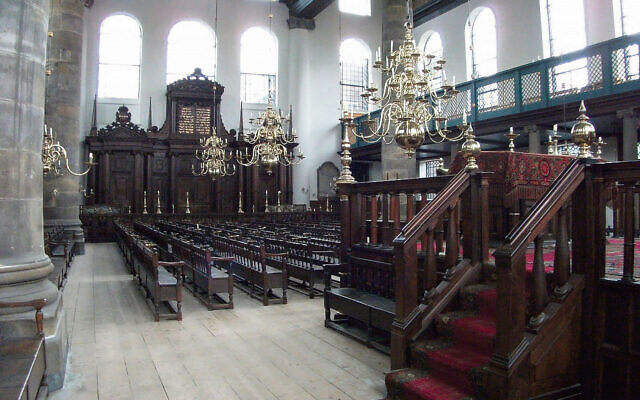The Spinoza controversy resurfaces in Amsterdam
Yitzhak Melamed, a professor of philosophy at Johns Hopkins University, has been denied entry to the Portuguese Synagogue and library in Amsterdam.
More than 350 years after Baruch Spinoza was excommunicated from the Spanish-Portuguese Jewish community in Amsterdam, a leader of the community banned a scholar of Spinoza’s work from visiting Amsterdam’s historic Portuguese Synagogue and library.
Yitzhak Melamed, a professor of philosophy at Johns Hopkins University, was informed he could not visit the synagogue after a film director asked for permission to film Melamed conducting research in the library’s archives.
Melamed had sought access to the synagogue to make a documentary about Spinoza, whom the Portuguese Jewish community of Amsterdam excommunicated in 1656 for writings that it deemed heretic.
In a letter to the professor, Rabbi Joseph Serfaty, a leader of Amsterdam’s Sephardic community, told Melamed he would not be welcomed into the building – a building in which Spinoza himself may have studied, as he was enrolled in the school that was once housed there.
“The chachamim and parnassim of Kahal Kados Torah excommunicated Spinoza and his writings with the severest possible ban, a ban that remains in force and cannot be rescinded. You have devoted your life to the study of Spinoza’s banned works and the development of his ideas,” Serfaty wrote, using the Hebrew words for the community’s leaders.
He concluded the letter by barring Melamed from the building. “I therefore deny your request and declare you persona non grata in the Portuguese Synagogue complex,” he wrote.
However within a week the organisation responsible for the historic synagogue apologised for Serfaty’s action.
Serfaty had acted without approval from the board of the Jewish Cultural Quarter, a city-funded institution that runs the Jewish Museum of Amsterdam and the non-religious components of the synagogue, according to Michael Minco and Emile Schrijver, the head of the board of directors of the synagogue and the head of the Jewish Cultural Quarter, respectively.
“We regret that a perfectly normal request to visit the premises of the Portuguese Synagogue […] has led to an international uproar,” Minco and Schrijver wrote to Melamed last Tuesday.
“We do hope that you will decide to pursue your plans to come to Amsterdam to do your work as requested. We are looking forward to welcoming you. Serfaty’s decision has been overturned.”
Serfaty has apologised in a statement for “the way in which the letter was sent” to Melamed but stands behind its content, according to the Dutch Jewish news site Jonet.
He did not reply to JTA’s repeated requests for comment.
JTA.ORG


comments